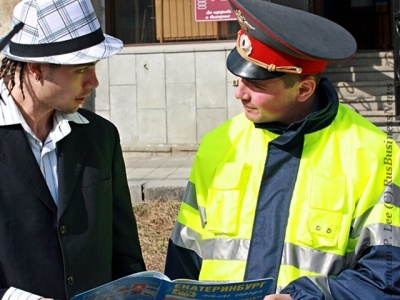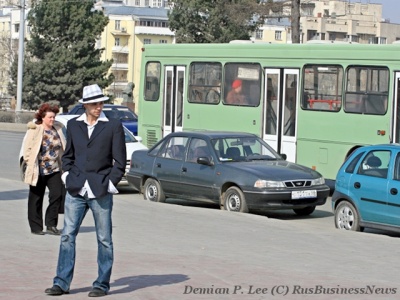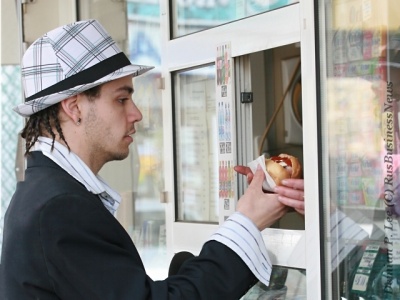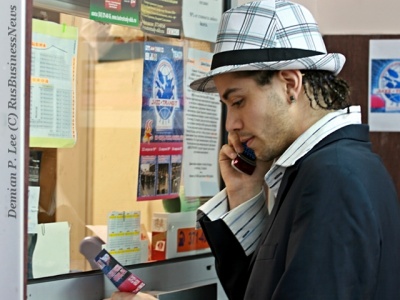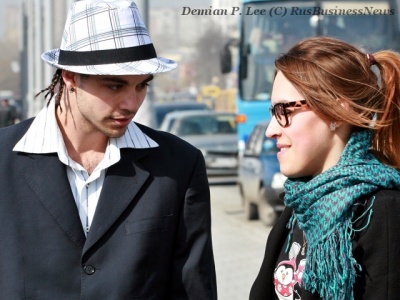 |
Home page / News & Analysis
/ Latest news
/ Lost in translation: how foreigners find way in Ekaterinburg
|
|
|
Lost in translation: how foreigners find way in Ekaterinburg
27.04.2010 — Analysis A foreigner going to a non-capital Russian city such as Ekaterinburg should keep in mind one thing. Typical tourist's questions - "How can I get to the hotel?", "Where can I buy a coffee?", or "Who is this monument for?" - are best addressed to passers-by rather than officials. The likelihood of encountering a person who speaks English is much higher among random passers-by than law-enforcement officers, vendors, or taxi drivers. The RusBusinessNews correspondent has proved this to be true in an experiment with her new acquaintance, an American who came to Ekaterinburg to teach English 7 months ago. One of my acquaintances, an Englishman, also teaching in Ekaterinburg, regularly writes to the internet diary where he records stories, situations, and observations mind-boggling for foreigners in Russia. This is one of his recent posts: - Yesterday a stranger in the street asked me for a "seega" ("a cigarette" - editor). If anyone knows, please tell me what it is. When I told him that I am English, he apologised for a long time, smiled, and wished me luck. I did not understand what he wanted, but he seemed a very friendly guy. I always bump into affable Russian people. Sometimes he puts into his blog posts of his friends also working in Russia. Here is one of them. "I can't stand your shops. Very bad service. People smile to a person coming into a shop in Germany. Here they don't want to sell anything. They just sit there. And this is what they get paid for? Very strange... unpleasant Russian sales assistants". One April day we decided to check whether the reaction to a foreigner differs between officials and plain city folks. Together with Chris Huntley the American, a teacher in one of Ekaterinburg's language schools, we walked in the centre of the city. We set ourselves a goal to understand how easy it would be to find the way around the city for a person who does not speak Russian, and whether people living in Ekaterinburg, a city that positions itself as an industrial and business centre, and, moreover, focuses efforts on the development of inbound tourism, are ready for cross-cultural communication. For the sake of purity of the experiment we agreed that Chris would not let on that he speaks and understands Russian. Words of the world on the tip of the tongue
The experiment started in the centre of the city around lunch time. Unfortunately there were no English language Ekaterinburg maps in kiosks and we had to equip ourselves with fold-out map in Russian which is not too easy for a foreigner. First of all we decided to find out how to get to one of the largest hotels in the city. We decided not ask passers-by and went directly to a traffic policeman who was on duty near an underground entrance. It is easy to see law enforcement officers in the street as they wear uniform and bright vests. The young guy turned out rather friendly, asked a colleague to stand in for him for a bit, and tried to help us. However, he spoke no English whatsoever. He did not react even on the Russian pronunciation of "hotel Sverdlovsk". He only understood what we wanted when we pointed to the spot on the map that we needed. He still could not help us in any way. Not speaking English he started to gesticulate eagerly and explain in his native tongue, which, of course, did not give us any idea of in what direction to go and what transport to take. After 5-7 minutes of speaking different languages by this time slightly irritated traffic policeman pronounced the cross-cultural word "taxi" and pointed to a queue of cars with "chequers". He thought, probably, that taxi drivers would be able to help us. He was mistaken. A typical Russian taxi driver was smoking next to one of the cars. A man of about 50, in tracksuit and worn black-gray-brown cap and a huge potbelly. The expression of his face, as well as all his appearance, was repulsive. For some time Chris did not dare come near him. There was no alternative and the first step had to be made. The reply to our wish expressed in English "we would like to get to hotel Sverdlovsk" was what could be expected. The driver sharply turned his back to us and walked away a few paces. We tried to be persistent but in reply we got this in Russian: "I do not understand what you are saying. I only speak Russian". Later, when Chris has gone, I asked the question how he speaks to foreigners because, since his spot is in the city centre, he sometimes might get people speaking foreign languages. The taxi driver replied that he knows neither English nor German. "I speak Russian. Or I don't speak at all", he said and got into the car.
Our last attempt was directed at a passer-by, a guy of about 25. He stopped, listened to the question, asked the hotel name again, thought for a bit and started explaining where the hotel was geographically, turn right-turn left-go straight style. When asked if one could get there using public transport, he replied in English that one could take a bus. He did not know what number though. He pointed where the bus stop was and, having excused himself, went on his way. If we really did not speak Russian and did not know where the hotel Sverdlovsk was we would have faced the next task: to find out where buses which stop in the city centre go, and to get to our destination. Remembering that 10 times out of 10 routes signs in public transport are not reproduced in English, people at stops are in a hurry and are not ready for a long dialogue, conductors are often migrants and speak even Russian not very well, we risked wasting a lot of time and nerves. Food for thought
The next subject of our experiment was a street van vending coffee and hotdogs. Great, both these words are the same in Chris's language, and in vendor's. The problems with understanding arose when the American asked how much it was. The woman in the van window could not understand what he wanted for some time. Very long time. Then, having probably turned her logic on, she had a lucky guess and started gesticulating 1-2-3-4 tens of roubles with her fingers. Having wasted few more minutes, we have managed to buy a sausage and a bap and a coffee in a plastic cup. However, Chris refused to eat it, having said that he is against this kind of food altogether. We decided to replace the food for the body with the food for the soul and went to a nearby theatre. There was no ticket agent in the office. This is yet another Russian peculiarity. During lunch time when, it seems, many office workers could have a break and buy a cinema or a theatre ticket, ticket offices close for lunch. We waited for a bit, the woman turned up. The "deaf and dumb" dialogue - questions in English "What performances are on tonight in the theatre?" and answers "I do not understand you" carried on for another five minutes. At first the woman got all confused, then called a colleague and together they found a way to rectify the situation. Having called an English speaking person they gave the receiver to Chris and he explained what he wanted. The person on the other end answered all his questions. This was our first victory - we did not make it to the hotel but knew for sure that on that night the Ekaterinburg Variety Theatre hosted the international festival Jazz Transit.
Like a fish in a bowl Adding to the aesthetic perception of the city we decided to go to the second most important square in Ekaterinburg, the one with the monument to the founders of Ekaterinburg Vasily Tatishchev and Georg Wilhelm de Gennin. There, strange as it may be, we met an American delegation and Chris was most surprised: we planned to talk to the city folk who often walk here and bumped into Americans. Chris's compatriots were much luckier - they had interpreters and representatives of the Consulate General of the US in Ekaterinburg with them. They probably did not have any problems with the perception of the city, they were kept in a group and told where, when, and in whose honour a particular monument has been built. We decided to ask the same touristy questions to a passing by student-looking girl. She was taken aback to start with, then with a smile and with the help of gesticulation she explained in rather good English who Messrs Tatishchev and de Gennin were and why this monument is in the centre of the city. Later she said that it was for a first time that she met an American who speaks no Russian at all in the street and was taken by surprise a little. When asked about the level of her English, she said she did it at the university. Also she said that if she met a German, she would have hardly been able to talk with him as she spoke only English.
When Chris and I had our little walk, we talked about his life in Ekaterinburg. He said that the culture shock was most certainly there when he arrived to the Urals. It was rather positive, however. He pointed out people being open and willing to help. He said that now he knows his way around the city centre while in the beginning he preferred to be accompanied by a local. He pointed out that almost all buildings in the city centre have signs with street names doubled in English. When he cannot find something, he prefers to ask passers-by. He also said that he likes local pubs and restaurants which he considers rather expensive, though. He does not have any problems in shops - "It is easy, you see what you are buying and how much it costs". One step away from dismantling language barriers The study conducted by the Language Link language school showed that 63% of 886 people surveyed in the Centre of Ekaterinburg do not speak English. Out of the remaining 328 almost 80% assess the standard of their English as poor or medium. Our experiment demonstrated that out of 6 people we managed to talk to 4 did not speak the universal English language. And all of them were employees of public organisations. The ticket clerk in the theatre admitted that "Unaccompanied foreigners are very rare here. As a rule it would be a group with an interpreter. Which is why knowledge of English is not required. Of course, I know a couple of important words like ‘ticket' and ‘price'." The traffic policeman, on the contrary, said that his knowledge of English is sometimes checked, but the experiment has proven that the training of employees for services sector and public sites is hardly done properly and they would not be ready should a real influx of foreigners to Ekaterinburg ever happen. Yevghenia Yeryomina, photo by Demian P. Lee |
| Regions | Project participants | Investment projects | Consulates and Trade Offices | News and Analysis | About the Project |
|
© RusBusinessNews, 2009. All rights reserved. Establishing a hyperlink to RIA RusBusinessNews is required for using any of the material published on this website. News and analytical reviews are translated into foreign languages by the TRANSLIT Translation Agency |
«Sum of technologies»® Web design Site promotion |
